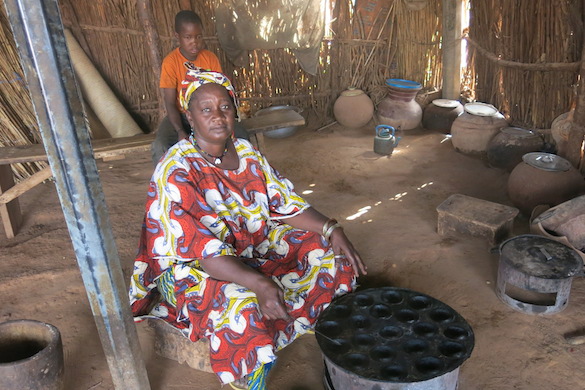The city of Douentza was hit hard by the 2012 violence in Northern Mali. The Jihadist occupation of the city brought local economic activities to a halt. Markets closed, the flow of goods stopped, and women couldn’t participate in economic development in many places.
Many micro-entrepreneurs, especially women, lost their main source of income and, with it, their ability to support their families. With support from NEF, USAID’s Office of Foreign Disaster Assistance (OFDA) and Food for Peace (FFP) office, many local small-business owners have gradually been rebuilding the their livelihoods.
One of those helped is Trissa Cissé, a cake vendor in Douentza-Gao. After the 2012 crisis Trissa lost her husband, her mother, and her business. She was unable to support herself and her seven children.
Another, Hamadoun Tamboura, a tailor in the Douentza market, had been able to earn a good living before the crisis. His shop allowed him to support his family, despite his disability. He earned an average of 45,000 CFA francs per week and employed two apprentices. During the unrest, he lost most of his customers from neighboring villages. Despite using all his savings and stock to purchase food, he was left unable to feed his extended family of 17.
“Being at home was unbearable,” says Hamadoun. “The children complained of hunger. I wasn’t sleeping at night. What would become of us once we emptied our millet stock or if the food prices increases?”
As part of NEF’s project in Douentza, Trissa and Hamadoun receiving food vouchers. The vouchers allowed them to invest money that would otherwise be spent on food into their businesses–allowing them to rebuild their livelihood.
With the help of NEF OFDA, and FFP, Trissa has been able to re-launch her business. She now serves rice cakes, beef soup, and juice at the Douentza market. Money from her business has also allowed her to purchase two goats, a rooster, and two hens with her savings. In total, she now owns four goats and a dozen chickens, which she hopes will improve her family’s economic situation.
“NEF’s support allowed me to regain hope and meet my family’s basic needs,” says Trissa.
At the end of the crisis, a few customers returned to Hamadoun’s shop–but not enough to support his family. NEF’s vouchers allowed him to plant a 1-hectare field where he now harvests 1.7 tons of millet.
In partnerhsip with the Office of Foreign Disaster Assistance and Food for Peace, NEF has helped more than 3,000 micro-entrepreneurs rebuild their livelihoods and ensure food security in northern Mali.



